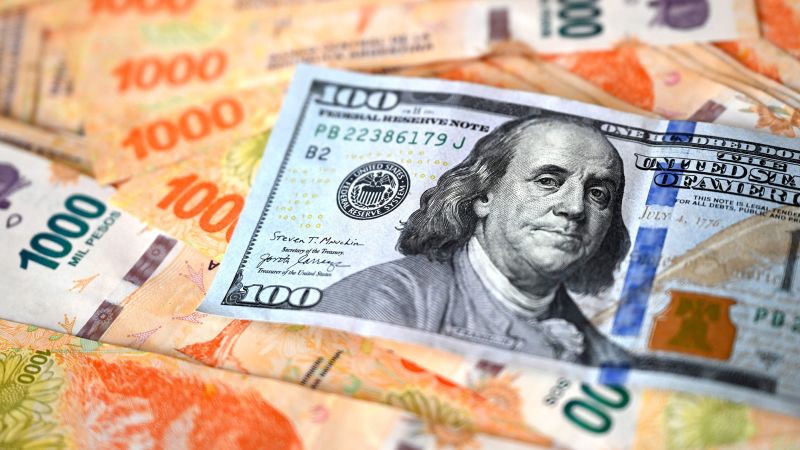Javier Milei won Argentina’s presidential election Sunday on a ticket to overhaul South America’s No. 2 economy and ditch its peso currency in favor of the US dollar.
Will the Libertarian’s radical plans see the light of day?
Milei’s La Libertad Avanza coalition won the election with nearly 56% of the vote, defeating the incumbent center-left Peronist party and its candidate, economy minister Sergio Massa.
In his victory speech Sunday, Milei provided few details of the economic policies he plans to adopt when he takes office on December 10. But the self-declared “anarcho-capitalist”— who wielded a chainsaw on the campaign trail to symbolize his plans to cut state spending — promised “drastic” reforms.
“The model of decadence has come to an end, there’s no going back,” Milei declared.
“Today we end the destructive model of the ever-present state, it only benefits a few while the majority of Argentina suffers,” he added, while also acknowledging the challenges facing him.
“We have monumental problems ahead of us: inflation, economic stagnation, lack of genuine employment, insecurity, poverty and indigence.”
Financial markets broadly welcomed Milei’s victory, which is likely to usher in a sea change in economic policymaking. Milei must tackle inflation above 140%, a shortfall in foreign currency reserves and the prospect of another painful recession.
Argentina’s dollar bonds rose Monday, while the New York-listed shares of several Argentine companies surged. State-owned energy company YPF (YPF) jumped 40%, and banks Banco Macro (BMA) and Grupo Financiero Galicia (GGAL) gained 20%.
Argentina’s financial markets are closed Monday for a local holiday, but the peso weakened slightly in partial trade to stand at around 353.58 to the US dollar. The value of the currency has plunged 875% to the dollar over the past five years.
Milei has pledged to remove currency controls and import restrictions, which analysts say would result in even more pressure on the peso, taking the value of the currency closer to the levels at which it trades on various informal markets.
Bruno Gennari, Argentina expert at fixed income broker dealer KNG Securities, said the peso was trading at $1,009 versus the dollar on crypto exchanges Monday, considerably weaker than the $869 and $975 rates seen on Friday.
A former economist and TV pundit who ran for president on a promise to “break the status quo,” Milei made “dollarizing” Argentina a signature campaign promise, hailing it as a cure for the country’s hyperinflation problem.
It’s a step that other countries have taken, just none the size of Argentina — Latin America’s third-biggest economy after Brazil and Mexico.
Dollarization means Argentina would give up the peso and use the US dollar as its currency, effectively wresting control of monetary policy from the country’s central bank and handing it to the US Federal Reserve.
The move would also deprive Argentina’s central bank of the ability to print money — a tactic it has frequently employed to help the country’s spendthrift government avoid defaulting on its debts. That, in turn, fueled rampant price rises.
Analysts agree dollarization would help tame inflation. But they doubt Milei has the political or popular support to deliver on this agenda.
“We suspect that some of his more radical proposals — namely dollarization — may not materialize, given limited support both in congress and among the public,” William Jackson, chief emerging markets economist at Capital Economics, wrote in a note Monday.
While dollarization “would be a surefire way to bring inflation under control, it wouldn’t be a solution to the country’s fiscal woes,” he added.
In a sign he may be seeking to gain support from centrist parties, Milei did not mention dollarization or previously mooted plans to shut down the central bank in his victory speech.
“It’s not going to happen in the near term,” said Thierry Larose, a portfolio manager at Vontobel Asset Management in Zurich. Quite apart from the political hurdles, the fragile state of Argentina’s economy leaves it in no position to dollarize, he told CNN, describing it as a “terrible idea.”
That’s because as things currently stand, the conversion rate would be highly unfavorable to the peso, drastically weakening the currency and likely leading to an increase in poverty, which government figures already put at around 40%.
“If you want to dollarize at (a) conversion rate that makes sense from a social and economic perspective, you need a minimal amount of international reserves,” Larose said. Currently, the government’s foreign exchange reserves are more than $10 billion in the red.
The “path towards dollarization,” however, could benefit the economy, Larose added.
“In order to dollarize … you need to stabilize (the economy): kill hyperinflation, rebuild foreign exchange reserves,” he said. “You need fiscal consolidation and eventually you need access to capital markets.”
That could still be some way off. The International Monetary Fund (IMF) has effectively barred Argentina from accessing international markets while the country pays back its debts. Argentina owes the Washington, DC-based lender some $44 billion following a historic bailout in 2018.
Kristalina Georgieva, the fund’s managing director, congratulated Milei on his election victory Monday. “We look forward to working closely with him and his administration in the period ahead to develop and implement a strong plan to safeguard macroeconomic stability and strengthen inclusive growth for all Argentinians,” she wrote on X, the platform formerly known as Twitter.
Milei will need all the help he can get. The World Bank expects the Argentine economy to contract by 2.5% in 2023, owing in part to a devastating drought that is estimated to have cost it $20 billion in lost agricultural exports.
What’s more, Jackson, of Capital Economics, expects the IMF to “shift away” from its recent leniency toward Argentina. “It’s not clear if a debt restructuring will be demanded at this point, but we are moving in that direction,” he said.
— Valentina Gonzalez, Stefano Pozzebon, Olesya Dmitracova and Reuters contributed reporting.
Read the full article here




